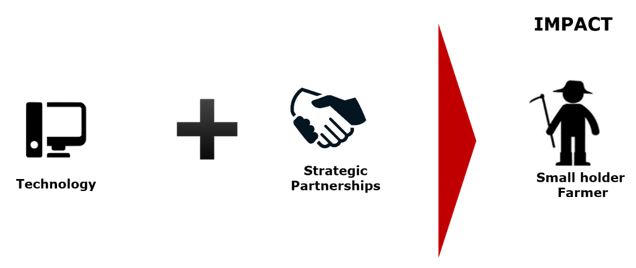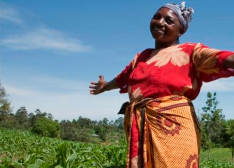This is a guest blog post written by Herbert Thuo from Virtual City.
Virtual City is a solutions provider, specialising in the development and deployment of mobile based retail and financial solutions for agribusiness. Our work revolves around supply automation mainly across tea, coffee, dairy, horticulture and grain verticals, in a bid to create efficiency, visibility and transparency for all key stakeholders.
We provide digital tools that accelerate financial inclusion for farmers and de-risk investment decisions for financial service providers.
Virtual City is active in Kenya, Uganda, Rwanda and Tanzania and our vision is entry into twenty more countries in Africa over the next five years.
Our passion is centered around smallholder farmers and Small Medium Enterprises (SMEs); as a result, we are constantly developing and deploying solutions that increase and unlock their value. Our focus is on eliminating fraud, increasing visibility and using big data analytics to drive financial inclusion and, as a consequence, value for traditionally undervalued actors.
Our mobile enabled solutions are centred on bridging the divide between finance, provision and distribution of services in food in Africa. Our solutions are based on tried and tested methods and are centered around value chain efficiency and fraud reduction wins.
Our approach
Our endeavor is to work with key allies within the entire ecosystem who have an integral effect on the well-being and social dynamics of smallholder farmers and SMEs. We firmly believe that technology is an enabler and, through strategic collaborations, we can achieve the desired impact.
We do this through our 5 level engagement approach:
1. Farmer
Smallholder farmers are the cornerstone of the value chain. We use simple mobile based technology to track the quality and quantity of the raw commodity they deliver to the buying centres. The main activity here is farmer registration, where they are issued with an NFC card that contains all their bio data.
2. Aggregation centres
Buying centres are the farmers’ first aggregation point. Data begins to be generated when farmers deposit any quantity of their agricultural produce. Here, the weighing and measurement of farmer produce is carried out and facilitated by the following hardware kits:
- An android enabled mobile device which inputs the key information into our Virtual City platform
- A hanging digital scale or flatbed scale for measuring quantity of produce
- A milk tester or moisture meter to measure quality of milk or grain respectively
- A thermal printer to provide the farmer with a receipt containing details of both quality and quantity measured.
3. Coolers and warehouses
Coolers and warehouses provide an aggregation function for wholesale buyers while enabling traceability for downstream markets from the buying centers. We provide certification kits which also enhance commodity marketing. A certification kit is a valid document that shows proof of ownership for farmer produce stored in the warehouse (for grain farmers) or cooling plants (for dairy farmers), which can be used to access services, loans from financial institutions or inputs from local Agrovet shops.
4. Trading and warehouse receipting
Trading and warehouse receipting through our collateral management platform enables grain traders and buyers to have access to farmers’ stored collateral at very competitive prices, creating a positive financial impact for the smallholder farmer.
5. Distribution
Distributors and wholesalers are responsible for the distribution of the finished commodity (or inputs such as seeds) to retailers such as the Agrovets. This is made possible through our technology platform.
Impact so far
- Dairy
We have managed to deliver a solution to a large dairy cooperative in Kenya which services over 100,000 dairy farmers. Since its implementation, the cooperative has increased milk collections by over 300%. The main driver was an increase in farmers’ deliveries on account of the financial transparency and mutual accountability that our technology platform provides compared to their previous buyer relationships. - Grains
We are working with over 16 warehouse operators and other related aggregators across Kenya, Uganda and Tanzania to unlock financial inclusion. We are currently working with over 5,000 smallholder farmers in Kenya across 64 aggregation centres as our first phase of implementation. The number of farmers we intend to impact is 36,000 by June 2016. - Tea
We are working with over 350,000 smallholder farmers across Kenya and Rwanda and we have helped Kenya Tea Development Authority keep track of 321,642 MT of green leaf tea per year. On average, through our technology, we have increased the delivered yield per farmer, verified at 13.5% from the inventory management improvements alone. We are now working on facilitating access to cheaper loans for more and more farmers.
We believe that the above key highlights illustrate how technology can enable the much-needed impact for the farmers in Africa.
Herbert is the Business team leader at Virtual City. He has worked extensively in the IT and Software industry, bringing innovative approaches to the Agri Business supply chain. He has an MBA from USIU and a Bachelor’s degree from JKUAT.



